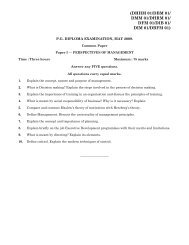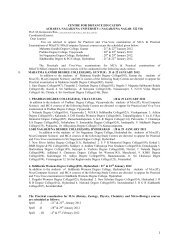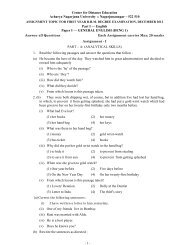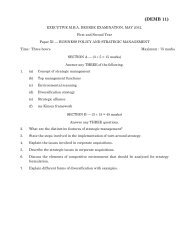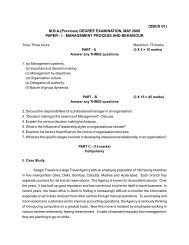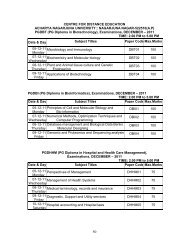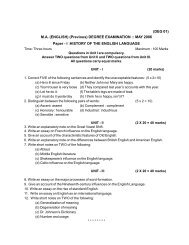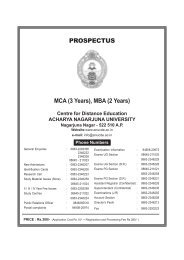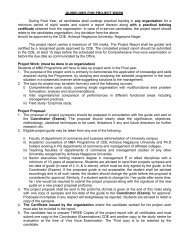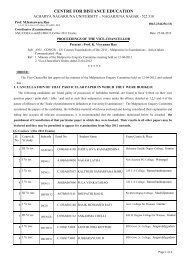MBA/MCA Entrance Test - October - 2011 - ANUCDE
MBA/MCA Entrance Test - October - 2011 - ANUCDE
MBA/MCA Entrance Test - October - 2011 - ANUCDE
Create successful ePaper yourself
Turn your PDF publications into a flip-book with our unique Google optimized e-Paper software.
SECTION C<br />
COMMUNICATION ABILITY<br />
50 Marks<br />
PART I<br />
Directions (151 to 155) : Read the following passages and answer the<br />
questions that follow:<br />
The perpetuation of the status hierarchy based on the concept of men as<br />
‘superior’ and women as ‘inferior’ has made many women subservient,<br />
self-effacing and fatalist. This hierarchy is still being maintained in our<br />
male-dominated society. Even now a woman is defined not in terms of her<br />
performance but in relation to man. She is projected as weak, passive,<br />
home-oriented woman, less intelligent and less capable than man, and thus<br />
enshrined in mythology, symbolism and stereotype ideals. Because of such<br />
discrimination in treatment from childhood, women develop a deep seated<br />
tendency to under-estimate their own talents and powers and this complex has<br />
become a stumbling block in their aspiring for the economic emancipation and<br />
equal social status alongside men.<br />
One of the basic requirements for entrepreneurship is self-confidence.<br />
Although women are as qualified as men to succeed as entrepreneurs, they<br />
suffer from two distinct disadvantages. The first is the initial lack of confidence<br />
in their own abilities. The second disadvantage is society’s lack of confidence in<br />
women’s ability.<br />
151. The hierarchical order of a male-dominated society leads to<br />
(1) the promotion of a feeling of inferiority in men and women.<br />
(2) the lack of confidence in their abilities as built up in women by<br />
themselves and by society.<br />
(3) the lack of confidence in women’s abilities as developed by women, as<br />
against society’s confidence in them.<br />
(4) Society’s lack of confidence in women as against women’s self-confidence.<br />
152. Women’s diffidence and inferiority, as the passage cites, have resulted in<br />
(1) their gaining of equal social status with men.<br />
(2) their seeking of economic emancipation.<br />
(3) their under-estimation of their talents.<br />
(4) their entrepreneurial ability.<br />
21<br />
MB/MCCET <strong>2011</strong>



